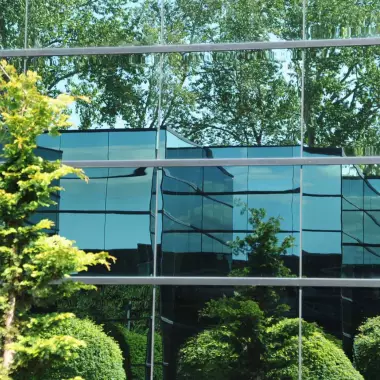It is a truth (almost) universally acknowledged that we need to do more to slow climate change and protect our planet. This includes cutting our emissions, reducing waste and adopting cleaner energy.
But change is still proving slow to materialise. Businesses, like everyone else, are beginning to feel the pressure of adopting more sustainable practices, but many continue to lag behind and are failing to fully commit to greener operations.
But why is this the case?
In our latest environment report, we set out to discover why businesses aren’t doing more and what the key perceived barriers to change are. Here is a summary of what we found.
The biggest barrier to change
After surveying more than 100 businesses for our environmental report, we discovered that the biggest barrier to change was perceived to be customer requirements (50.9%).
As we noted in our report, this is a somewhat surprising finding as it appears that many consumers are actually now actively seeking businesses that boast stronger green credentials. Indeed, 22% of our respondents admitted that their environmental standing was ‘very important’ to their customers while another 47% said it was ‘quite important’.
A new study by Accenture of 25,000 consumers in 22 countries has also indicated that consumers are becoming more discerning when it comes to the environmental consciousness of the companies they buy products and services from. The study unearthed a new type of consumer that Accenture has labelled ‘reimagined’. These consumers have different values which include a focus on product origin, which incorporates a focus on the environment, sustainability and corporate responsibility.
By perceiving customers as a barrier to greater environmental sustainability businesses could therefore be inadvertently alienating a new group of influential customers as well as missing out on a unique selling point which would differentiate them from their competitors.
Financial barriers
It was less surprising to discover that finances were the second biggest barrier according to our respondents (41.8%).
Real, long-term change for true sustainability requires a significant investment of both time and money, which can deter businesses that have tight budgets or a strong focus on KPIs and short-term cost saving.
However, by making these investments businesses could reap the rewards in the long-term. For example, building greener structures may be more costly in the short-term, but the long-term gains over the course of the building’s life can make this worthwhile.
Greater environmental sustainability can also insulate businesses against negative market movements, saving them money. For instance, switching to cleaner energy sources or investing in renewable energy could protect a business from energy price volatility or fuel shortages, giving them an advantage over their competitors.
In short, taking a few risks and being an early adopter of new technologies or ways of working could give businesses a whole host of benefits over the long term.
 A question of space
A question of space
Another very real barrier is the fact that many businesses, especially smaller ones, function within workplaces that are not under their control. For example, cleaning companies operate in the workplaces of their clients whereas sole traders may run their business in a shared office space. In our survey, 31.8% of respondents said that they worked in customer spaces while another 15.5% reported that they operated from a shared space.
However, there may still be ways in which a business operating in this way can boost their sustainability. For instance, they could investigate more environmentally friendly cleaning materials or find more sustainable ways of travelling to their workspaces, such as via an electric car. In a shared space, they could adopt a paperless policy for themselves and ensure that their workstations are powered down at the end of the day.
In the long term, those working in shared spaces could also look to switching to an office building that boasts better green credentials. Eco-friendly and sustainable business centres are growing in popularity, so look out for office providers that have motion-sensitive LED lighting or plenty of natural light, use eco-friendly cleaning materials, have electric car charging points supplied via renewable energy and low carbon building designs.
Remote working
Since the onset of the pandemic, many businesses now offer remote working or hybrid working. As a result, it can be difficult to sustain environmentally friendly operations, as cited by 13.6% of our respondents, although having remote workers does mean that the energy use of any headquarters will be reduced, and fewer workers will need to commute. It is also likely that remote workers will be less inclined to use large amounts of paper for printing.
However, remote workers can also be encouraged to transfer sustainable practices to their home working environment, which can also help them to save money. For instance, they could change to LED lighting (perhaps with reimbursement by the business), switch all equipment off at the end of the day and ensure they make their own lunches and coffee every day.
Lack of leadership

Another barrier cited by 9.1% of those questioned was that there is a lack of leadership within their organisation.
This is a true barrier as significant environmental change relies upon effort being given by every level of decision-maker. However, it can be difficult to lead change if an individual fears being seen as a disrupter because sustainability is not widely embraced.
To ensure leadership embrace sustainability, it may be necessary to set out the very real costs and risks of remaining unsustainable, many of which have been touched upon earlier in this article. This will reposition sustainability as a business need rather than a ‘nice to have’. It may also be useful to network with other sustainable businesses to showcase the benefits of more environmental operations and build a new set of supportive relationships that can help a business to permanently change its culture.
Barriers can be overcome
While it is undeniable that businesses face many barriers to becoming more sustainable, it does not follow that these are insurmountable. Change may be difficult, but it is certainly possible for more businesses to become greener.
If you’d like to find out more about current business attitudes towards sustainability and what other organisations are doing to become more environmentally friendly, download a copy of our in-depth report.

